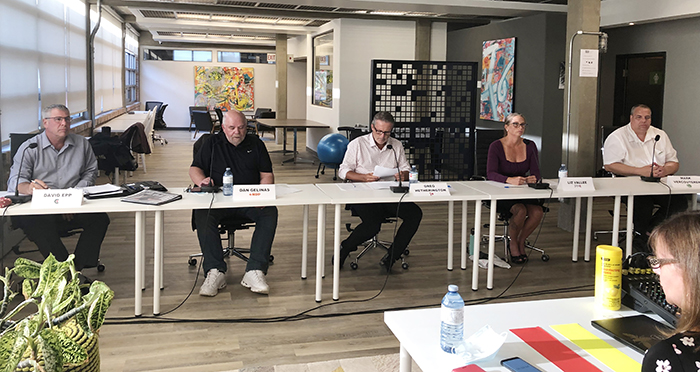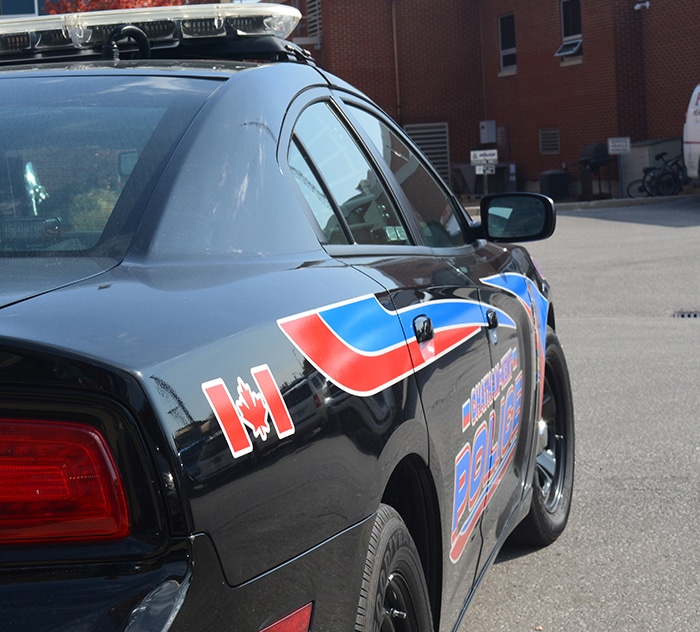
By Pam Wright
Local Journalism Initiative Reporter
Prime Minister Justin Trudeau’s Liberals are feeling the heat in Election 2021 and it was the same story at the first Chatham-Kent-Leamington all-candidate’s meeting Sept 1.
Held at the SOAR Innovation Hub in downtown Chatham, the event saw all five hopefuls prepared and ready to answer questions.
Conservative incumbent Dave Epp, NDP candidate Dan Gelinas, Liberal hopeful Greg Hetherington, People’s Party of Canada candidate Liz Vallee and Green Party candidate Mark Vercouteren put forward their views as part of the panel.
Each candidate was allowed a two-minute introduction, a two-minute closing statement, and all were given two minutes each to answer five questions on current issues.
What their party will do about climate change was one of the hot button topics.
According to the NDP’s Gelinas, a recent Angus Reid poll puts climate change as the most pressing issue Canadians are facing. However, Gelinas said the traditional parties aren’t doing anything to solve the problem, adding the Conservative party denies that climate change exists.
“They are long on aspirations and short on details,” he explained, “with no restrictions on emissions.”
And the Liberals are not any better, Gelinas noted, as Trudeau has handed out millions to “Big Oil” and gas without meeting any of Canada’s emission targets.
Gelinas said the NDP would cut emissions by half and pour money into electric transit, which in turn would create thousands of good-paying jobs.
Epp, the sitting MP, said the Conservatives have a “serious plan” to meet the Paris Accord emission benchmarks. They will also create a low carbon savings account – rather than a carbon tax – where individuals can direct the money to environmental issues as they see fit.
Expanding the use of electric vehicles and hydrogen fuel are other goals, he said, adding the Conservatives will funnel $3 billion in incentives to the agriculture and forestry industries by 2030.
According to Hetherington, climate change is the “biggest story of the century.”
The Liberal candidate cited the fires in British Columbia and rising seas as evidence of the need for change.
Hetherington said the Liberals plan on planting two billion trees, as well as aiming for net zero emissions by 2050 and a net zero electricity grid by 2035.
“Unlike the Conservative party that doesn’t believe in climate change, the Liberal party does,” he said, “and we’ll take action to make sure this planet is safe for you and your grandchildren.”
The Liberals have made significant investments in public transit recently, he noted, funding some 1,300 projects across the country.
In her response, Vallee said she has faith in humanity, adding humans always find a way to overcome environmental challenges.
“What we need to do is unleash people’s creativity” to come up with innovative solutions, Vallee said, noting Canada currently does not have adequate alternatives to fossil fuels.
“We are not ready to move away from fossil fuels,” she said, adding Canadians don’t need the government “dictating” solutions because the people will “figure it out.”
Vercouteren said Canada has all the green technologies it needs and that Canada just needs to build on and expand its programs.
The use of electrical vehicles needs to be increased, he said, adding the electric transit infrastructure must be expanded.
Mandating the use of electric vehicles by the federal government is something the Green Party would push for, Vercouteren said.
Vercouteren said the pandemic has taught the lesson that many Canadians can work from home, if they have adequate Internet, thereby reducing the carbon footprint.
Retrofitting homes to make them more energy efficient and affordable is another sector the Greens would incentivize.
Questions about innovation and the economy, affordable housing, childcare, and the rights of Canada’s Indigenous people against the backdrop of graves found at residential schools were also on the table.
In his remarks, Epp criticized Trudeau for calling an unwanted, unnecessary election.
“The majority of Canadians aren’t happy we are here tonight because the majority of Canadians don’t want an election,” he said, adding the timing was poor considering we’re in the middle of a fourth wave of the pandemic amidst the backdrop of bleak economy.
In her address Vallee stressed that she’s a “completely different candidate” from a “completely different party.”
Hetherington said he “loves the community of Chatham-Kent” and will do whatever he can to assist local constituents, adding he considers “good health care” to be the top issue.
Although candidates were told not to make personal attacks and stick to issues, that’s not how it played out.
Vallee was reminded midway not to use personal references, when she called Epp “Dave the Farmer” and Hetherington, “Greg the Radio Guy.”
During her closing statement, Vallee veered back into personal attack territory when she unveiled a poster of Trudeau’s infamous blackface photograph emblazoned with the words “Greg Hetherington’s New Boss.”
Organizer Andrea Colasanti, moderator of the event, said she was pleased with the outcome, adding all of the candidates were well spoken and prepared.
The Chatham native, who now lives in Ottawa, received a grant through the non-partisan Equal Voice’s Daughters of the Vote to host the event in her home riding.





